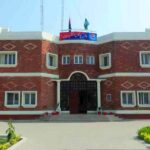Global Warming in Pakistan: The Devastating Consequences of Deforestation
By: Czechangez Khan Jadoon.
Pakistan is one of the countries most vulnerable to climate change, with global warming posing a significant threat to its environment, economy, and people. One of the major contributors to global warming in Pakistan is deforestation, particularly the cutting of jungles and forests. This article will explore the impact of deforestation on global warming in Pakistan and the devastating consequences it has for the country.
Causes of Deforestation in Pakistan
Deforestation in Pakistan is primarily driven by agricultural expansion, urbanization, and logging. The country’s forests are being cleared at an alarming rate to make way for agricultural land, urban development, and infrastructure projects. The timber mafia and illegal logging activities are also significant contributors to deforestation in Pakistan.
Impact of Deforestation on Global Warming
Deforestation is a major contributor to global warming, as forests play a crucial role in absorbing carbon dioxide from the atmosphere. When forests are cut down or burned, the stored carbon is released into the atmosphere, contributing to the increase in greenhouse gases and global temperatures. In Pakistan, deforestation has led to a significant increase in carbon emissions, exacerbating the country’s vulnerability to climate change.
Consequences of Global Warming in Pakistan
The consequences of global warming in Pakistan are far-reaching and devastating. Some of the most significant impacts include:
- Rising Temperatures: Pakistan has experienced a significant rise in temperatures over the past few decades, with the country warming at a rate faster than the global average.
- Changing Precipitation Patterns: Climate change has altered precipitation patterns in Pakistan, leading to more frequent and intense floods and droughts.
- Water Scarcity: Global warming has led to a decline in water availability in Pakistan, affecting agriculture, industry, and human consumption.
- Loss of Biodiversity: Climate change is altering ecosystems in Pakistan, leading to the loss of biodiversity and extinction of many plant and animal species.
- Food Insecurity: Global warming is affecting agricultural productivity in Pakistan, leading to food insecurity and economic losses.
Solutions to Mitigate Deforestation and Global Warming
To mitigate the impacts of deforestation and global warming in Pakistan, the government and civil society must work together to:
- Promote Sustainable Forest Management: Implement sustainable forest management practices that balance economic, social, and environmental needs.
- Protect and Restore Forests: Protect existing forests from illegal logging and encroachment, and restore degraded forests through reforestation and afforestation efforts.
- Encourage Alternative Livelihoods: Support alternative livelihoods for communities dependent on forests, such as eco-tourism and sustainable agriculture.
- Raise Awareness: Raise awareness about the importance of forests and the impacts of deforestation on global warming.
- Develop Climate-Resilient Policies: Develop policies and plans that take into account the impacts of climate change and promote climate-resilient development.
Conclusion
Deforestation is a significant contributor to global warming in Pakistan, with devastating consequences for the country’s environment, economy, and people. To mitigate these impacts, it is essential to promote sustainable forest management, protect and restore forests, encourage alternative livelihoods, raise awareness, and develop climate-resilient policies. By working together, we can reduce the impacts of global warming and ensure a sustainable future for Pakistan.
Recommendations
Based on the analysis above, the following recommendations are made:
- Strengthen Forest Governance: Strengthen forest governance and law enforcement to prevent illegal logging and encroachment.
- Increase Funding for Conservation: Increase funding for conservation and restoration of forests.
- Promote Community-Led Conservation: Promote community-led conservation initiatives that support sustainable forest management.
- Develop Climate-Resilient Agriculture: Develop climate-resilient agriculture practices that support food security and sustainable development.
- Raise Awareness and Build Capacity: Raise awareness about the impacts of deforestation and global warming, and build capacity for climate-resilient development.
By implementing these recommendations, Pakistan can reduce the impacts of global warming and ensure a sustainable future for its people and environment.











